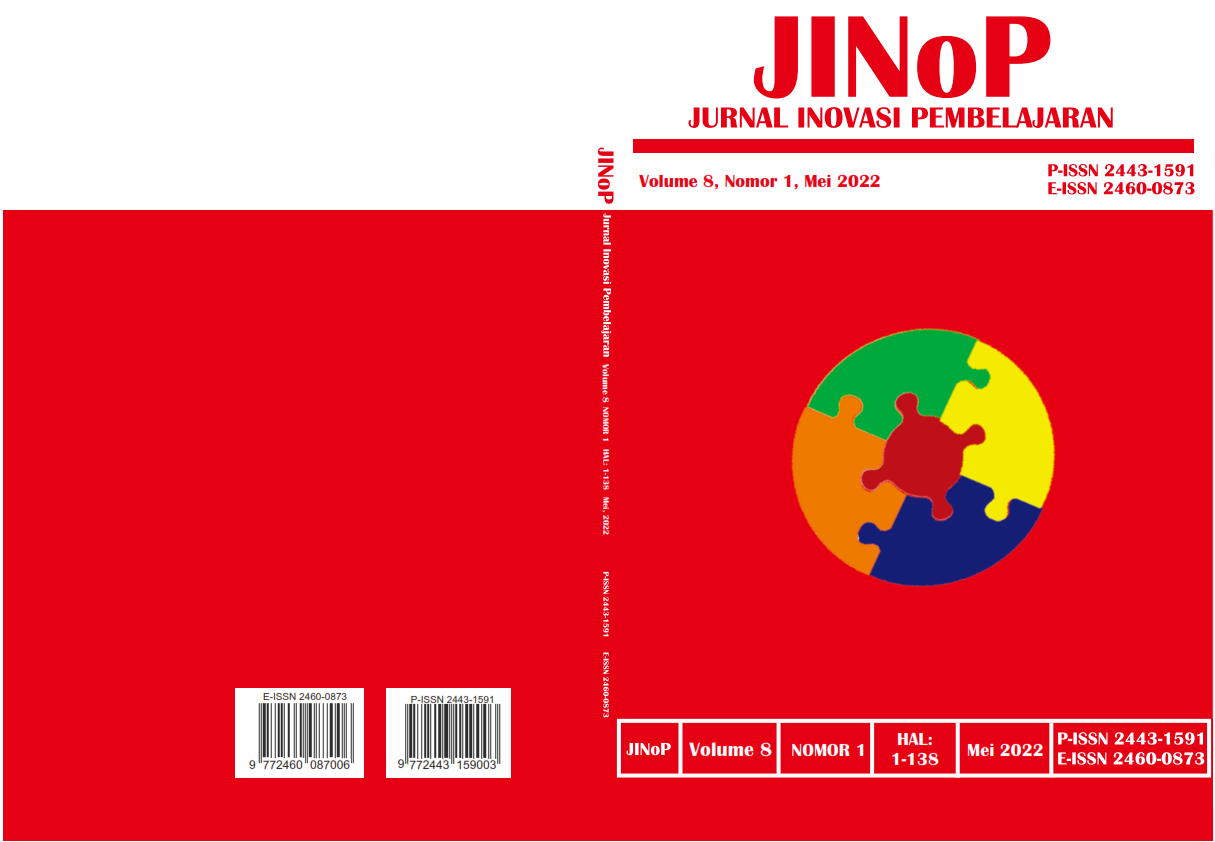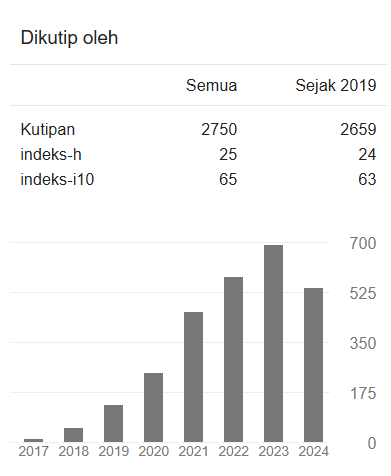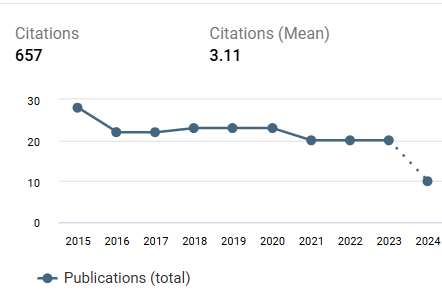Innovation integration of Islamic values in learning environmental themes in biology education
DOI:
https://doi.org/10.22219/jinop.v8i1.19565Keywords:
Muhammadiyah values, STAD-PjBL, environmental, biology educationAbstract
This article aims to analyze the innovation of integrating the values of Islamic Values in learning environmental themes in the Biology Education Study Program at Muhammadiyah Higher Education. It is library research with qualitative data based on the secondary data. The source triangulation technique was employed to check the data validity. The obtained data were analyzed using descriptive qualitative analysis using VOSviewer software, which are described through the results of behaviour and sentences observed by the researcher. Content analysis was employed as the analysis technique. the results showe 17 formulations of the importance and urgency of Islamic Values and 12 formulations of Islamic Values and their integration in learning environmental themes. This means that Islamic Values need to be integrated into learning environmental themes in the Biology Education Study Program at Muhammadiyah Higher Education along with the learning model. Among the model that can be used is integrative STAD type Cooperative Learning and Project-Based Learning
Downloads
References
Abdelzaher, D. M., Kotb, A., & Helfaya, A. (2019). Eco-Islam: Beyond the Principles of Why and What, and Into the Principles of How. Journal of Business Ethics, 155(3), 623–643. https://doi.org/10.1007/s10551-017-3518-2
Afandi, M., Chamalah, E., & Wardani, O. P. (2013). Model dan metode pembelajaran di sekolah (G. Gunarto (ed.)). UNISSULA Press. http://research.unissula.ac.id/file/publikasi/211313015/9230susun_ISI_DAN_DAFTAR_PUSTAKA_BUKU_MODEL_edit_.pdf
Alibraheim, E. A., & El-Sayed, S. A. (2021). Exploring Female Undergraduate Education Students’ Perceptions of Collaborative Online Project-Based Learning (COPBL). Eurasia Journal of Mathematics, Science and Technology Education, 17(8), 1–13. https://doi.org/10.29333/EJMSTE/11079
Amien, S., Thoyyibah, A., Ibrahim, J. T., Hudha, A. M., Khozin, K., & Syaifuddin, M. (2021). Panduan Pendidikan dan Pembinaan Al-Islam dan Kemuhammadiyahan Universitas Muhammadiyah Malang. Universitas Muhammadiyah Malang.
Anis, M. (2019). Muhammadiyah dalam Penyebaran Islam. Jurnal Mimbar: Media Intelektual Muslim Dan Bimbingan Rohani, 5(2), 65–80. https://doi.org/10.47435/mimbar.v1i1.279
Anonim. (2021). Gerakan Menyejukkan Bumi Menjadi Agenda Besar Konsolidasi Nasional Majelis Lingkungan Hidup Muhammadiyah. Kwartir Pusat Gerakan Kepanduan Hizbul Wathan. https://hizbulwathan.or.id/gerakan-menyejukkan-bumi-menjadi-agenda-besar-konsolidasi-nasional-majelis-lingkungan-hidup-muhammadiyah/
Anshori, A., Bahtiar, A. P., Jinan, M., Hanafi, I., Wiharto, M., Khalil, M., Anwar, S., Aziz, M., Sumiyanto, A., Rahmawan, H., Setiawan, B., Bunyamin, B., Rahman, T., Paryanto, P., & Khoirudin, A. (2018). Materi Induk Perkaderan Muhammadiyah. Majelis Pendidikan Kader Pimpinan Pusat Muhammadiyah.
Anshori, A., Mu’ti, A., Setiawan, B., Budiyanto, G., Rafdhi, F., Misriandi, M., Balad, I., Asegar, M. H., & Putra, H. A. (2020). Bengkulu Message: Risalah pembaruan perkaderan Muhammadiyah. Majelis Pendidikan Kader Pimpinan Pusat Muhammadiyah.
Ardoin, N. M., Bowers, A. W., & Gaillard, E. (2020a). Environmental education outcomes for conservation: A systematic review. Biological Conservation, 241, 108224. https://doi.org/https://doi.org/10.1016/j.biocon.2019.108224
Ardoin, N. M., Bowers, A. W., & Gaillard, E. (2020b). Environmental education outcomes for conservation: A systematic review. Biological Conservation, 241(November 2019), 108224. https://doi.org/10.1016/j.biocon.2019.108224
Baidhawy, Z. (2015). The role of faith-based organization in coping with disaster management and mitigation Muhammadiyah’s experience. Journal of Indonesian Islam, 9(2), 167–194. https://doi.org/10.15642/JIIS.2015.9.2.167-194
Barus, L. D. G., Herman, H., & Niswa, H. (2020). The Effect of Student Teams Achievement Divisions (STAD) to the Students’ Writing Ability on Recount Text. Journal of English Education and Teaching, 4(4), 536–547.
Burhani, A. N. (2020a). Resisting conservatism Muhammadiyah’s experience through its social activities. In Rising Islamic Conservatism in Indonesia: Islamic Groups and Identity Politics (pp. 80–94). https://www.scopus.com/inward/record.uri?eid=2-s2.0-85095610526&partnerID=40&md5=abf0b50101ac0070ba25412ad59b22b5
Burhani, A. N. (2020b). Torn between Muhammadiyah and Ahmadiyah in Indonesia: Discussing Erfaan Dahlan’s religious affiliation and self-exile. Indonesia and the Malay World, 48(140), 60–77. https://doi.org/10.1080/13639811.2019.1663678
Burke, T. A., Wayne E. Cascio, Daniel L. Costa, Deener, K., Fontaine, T. D., Fulk, F. A., Jackson, L. E., Munns Jr., W. R., Orme-Zavaleta, J., Slimak, M. W., & Zartarian, V. G. (2017). Perspectives | Brief Communication Rethinking Environmental Protection : Meeting the Challenges of a. Environmental Health Perspectives, 125(3), 43–49.
Chung, R. Y. N., & Li, M. M. (2020). Anti-Chinese sentiment during the 2019-nCoV outbreak. The Lancet, 395(10225), 686–687. https://doi.org/10.1016/S0140-6736(20)30358-5
Esminarto, E., Sukowati, S., Suryowati, N., & Anam, K. (2016). Implementasi model STAD dalam meningkatkan hasil belajar siwa. BRILIANT: Jurnal Riset Dan Konseptual, 1(1), 16–23.
Faridi, F. (2021). Al-Islam dan Kemuhammadiyahan (AIK) dalam pandangan mahasiswa Universitas Muhammadiyah Malang (UMM). Falasifa: Jurnal Studi Keislaman, 12(1), 50–64.
Farihen, F., Kusen, K., Sari, Z., Fakhrurrozi, F., Achmad, N., Mundzir, I., & Gunawan, A. (2018). Kemuhammadiyahan. Suara Muhammadiyah.
Fatah, A., Taruna, T., & Purnaweni, H. (2014). Konsep Pengelolaan Sampah Berbasis Teologi. Jurnal Ilmu Lingkungan, 11(2), 84. https://doi.org/10.14710/jil.11.2.84-91
Guo, P., Saab, N., Post, L. S., & Admiraal, W. (2020). A review of project-based learning in higher education: Student outcomes and measures. International Journal of Educational Research, 102(April), 101586. https://doi.org/10.1016/j.ijer.2020.101586
Hakim, S. A. (2015). Strategi kebudayaan Muhammadiyah. In M. A. Tanjung, R. Rusdianto, R. A. Amirrachman, & S. Budi (Eds.), Muhammadiyah “Ahmad Dahlan” Menemukan kembali otentisitas gerakan Muhammadiyah. STIE Ahmad Dahlan.
Hamidah, H., Fauziah, T. A. S. R. S., Puspita, R. A., Gasalba, R. A., & Nirwansyah, N. (2019). HOTS-oriented modul: Project-based learning. In Pride and Prejudice. SEAMEO QITEP in Language HOTS-Oriented.
Hancock, R. (2020). Environmental conversions and muslim activists: constructing knowledge at the intersection of religion and politics. Social Movement Studies, 19(3), 287–302. https://doi.org/10.1080/14742837.2019.1665505
Handoyo, B., Astina, I. K., & Mkumbachi, R. L. (2021). Students’ environmental awareness and pro-environmental behaviour: Preliminary study of geography students at state university of malang. IOP Conference Series: Earth and Environmental Science, 683(1). https://doi.org/10.1088/1755-1315/683/1/012049
Hazmi, M., Putra, D. W., Gunasti, A., & Jalil, A. (2020). Ideologi Muhammadiyah. In Ideologi Muhammadiyah (Issue July). PT. Jamus Baladewa Nusantar. https://doi.org/10.32528/342988839_ideologi
Huda, S., & Kusumawati, D. (2019). Muhammadiyah Sebagai Gerakan Pendidikan. Tarlim: Jurnal Pendidikan Agama Islam, 2(2), 163. https://doi.org/10.32528/tarlim.v2i2.2607
Hudha, A. M., Husamah, H., & Rahardjanto, A. (2019). Etika Lingkungan (Teori dan praktik pembelajarannya). UMM Press.
Husamah, H. (2013). Penerapan cooperative learning STAD terintegrasi project-based learning untuk meningkatkan motivasi, kemampuan berpikir, hasil belajar, dan kesadaran metakognitif dengan tugas menulis jurnal belajar pada matakuliah sumber belajar dan media pembelajaran. Pendidikan Biologi FKIP Universitas Muhammadiyah Malang.
Husamah, H. (2016). Islamic Deep Ecology: Integrasi nilai-nilai Islam dan pendidikan mengurai problematika lingkungan hidup. In H. Husamah & A. Setiawan (Eds.), Pemahaman lingkungan secara holistik. UMM Press & PSLK UMM.
Ibrahim, I. S., & Adnan, N. H. (2019). Student Teams-Achievement Divisions (STAD) in Enhancing Speaking Performance among English as Second Language (ESL) Learners: A Critical Review. Creative Education, 10(12), 2840–2849. https://doi.org/10.4236/ce.2019.1012210
Iman, B., Irfan, I., Hairul, H., Sihab, S., & Tahir, T. (2018). Eksistensi Muhammadiyah dan Pengaruhnya Terhadap Kehidupan Beragama Masyarakat di Desa Pasui Kecamatan Buntu Batu Kabupaten Enrekang. Prosiding Konferensi Nasional Ke- 7, Maret, 57–69.
Joyce, B., Weil, M., & Calhoun. (2009). Model Teaching, Model-model Pengajaran. Pustaka Pelajar.
Kamaruddin, K., & Idris, M. (2015). Eksistensi dan peranan persyarikatan Muhammadiyah terhadap perkembangan pendidikan Islam. Jurnal Pendidikan Dan Pemikiran Islam, 3(1), 217–243.
Karataş, A. (2016). Environmental impacts of globalization and a solution proposal. Environmental Impacts of Globalization and a Solution Proposal, 6(2), 64–70.
Karyadi, B. (2016). Pengembangan model bahan ajar pendidikan lingkungan berbasis masalah untuk siswa sekolah dasar. IJEEM: Indonesian Journal of Environmental Education and Management, 1(2), 22–35.
Kastolani, K. (2020). Islam and modernity: An Islamic reform movement in Indonesia. Kreasi Total Media.
KBBI. (2015). Model. https://kbbi.kemdikbud.go.id/entri/model
Khalil, M., Sumiyanto, A., Bahtiar, A. P., Rahmawan, H., Hanafi, I., Muamarah, M., Azis, M., & Rahman, T. (2017). Pedoman Perkaderan di PTM/PTA. Majelis Pendidikan Kader & Majelis Diktilitbang Pimpinan Pusat Muhammadiyah.
Khoirudin, A., Baidhawy, Z., & Nor, M. R. M. (2020). Exploring muhammadiyah’s historical civilizational dimension of social reconstruction in Indonesia: Humanitarian and cosmopolitan approaches. Journal of Al-Tamaddun, 15(1), 183–197. https://doi.org/10.22452/JAT.vol15no1.13
Krajcik, J. S., & Shin, N. (2014). Project-based learning. In R. K. Sawyer (Ed.), The Cambridge handbook of the learning sciences (2nd Ed., pp. 275–297).
Lubis, L. H. (2020). Differences of Student Learning Achievement Using Cooperative Learning Models of Student Team Achievement Division (STAD) Type with Jigsaw Reviewed from …. Budapest International Research and Critics Institute …, 3776–3783. http://www.bircu-journal.com/index.php/birci/article/view/1442
Majelis Pendidikan Kader. (2018). Pedoman Pelaksanaan Perkaderan Muhammadiyah. Majelis Pendidikan Kader Pimpinan Pusat Muhammadiyah.
Mardhiah, I., Aulia, R. N., & Narulita, S. (2014). Konsep Gerakan Ekoteologi Islam Studi atas Ormas NU dan Muhammadiyah. Jurnal Studi Al-Qur’an Membangun Tradisi Berfikir Qur’ani, 10(1), 1–14.
Maria, U. H. (2012). Pembinaan Masyarakat Melalui Dakwah Muhammadiyah di Kabupaten Sragen tahun 1985-2005. Journal of Indonesian History, 1(1), 55–62.
Masmuh, A. (2020). Peran Muhammadiyah dalam membangun peradaban di dunia. “Gema Kampus” IISIP YAPIS Biak, 15(1), 78–93.
Mawardi, M. (2018, December). Sikap Majelis Lingkungan Hidup PP Muhammadiyah Tentang Bencana Lingkungan. Suara Muhammadiyah. https://suaramuhammadiyah.id/2018/12/23/sikap-majelis-lingkungan-hidup-pp-muhammadiyah-tentang-bencana-lingkungan/
Mawardi, M., & Supangkat, G. (2011). Akhlaq Lingkungan: Panduan Berperilaku Ramah Lingkungan. Majelis Lingkungan Hidup PP Muhammadiya Bekerjasama dengan Kementerian Lingkungan Hidup Republik Indonesi.
Mawardi, M., & Supangkat, G. (2020). Majelis Lingkungan Hidup Muhammadiyah. Home. http://lingkungan.muhammadiyah.or.id/content-4-sdet-visi-dan-misi.html.
Mawardi, M., Supangkat, G., & Miftahulhaq, M. (2011). Teologi lingkungan: Etika pengelolaan lingkungan dalam perspektif Islam. Deputi Komunikasi Lingkungan dan Pemberdayaan Masyarakat Kementerian Lingkungan Hidup Dan Majelis Lingkungan Hidup Pimpinan Pusat Muhammadiyah.
Miles, M. B., Huberman, A. C., & Saldana, J. (2019). Qualitative data analysis. SAGE Publications, Inc. https://us.sagepub.com/en-us/nam/qualitative-data-analysis/book246128#contents
Mirzaqon, A., & Purwoko, B. (2018). Studi Kepustakaan Mengenai Landasan Teori Dan Praktik Konseling Expressive Writing Library. Jurnal BK UNESA, 8(1), 1–8.
Murthadha, M. (2007). Islam ramah lingkungan. Islam Futura, 6(2), 61–69.
Mustakim, M., Arifin, S., Hakim, M. N., In’am, A., & Tumin, T. (2020). Indonesian Islamic modernist movement: Study on the background of Islamic Organization Muhammadiyah. International Journal of Psychosocial Rehabilitation, 24(8), 4961–4970. https://doi.org/10.37200/IJPR/V24I8/PR280511
Musthofa, Z. A., Husamah, H., Hudha, A. M., Muttaqin, T., Hasanah, I., & Setyawan, D. (2017). Mengurai Sengkarut Bencana Lingkungan (Refleksi Jurnalisme Lingkungan dan Deep Ecology di Indonesia). UMM Press.
Nadlif, A., & Amrullah, M. (2017). Buku ajar: Al-Islam dan Kemuahmmadiyahan-1. UMSIDA Press.
Nurhayati, S., Idris, M., & Burga, M. A.-Q. (2018). Muhammadiyah dalam Perspektif sejarah, organisasi, dan sistem nilai. CV. Orbittrust Corp.
Nurholis, N. (2020). Sejarah Muhammadiyah dan Pengaruhnya terhadap Sosial Keagamaan di Kota Bengkulu Tahun 2000-2015 [IAIN Bengkulu]. http://repository.iainbengkulu.ac.id/id/eprint/4783
Parker, L. (2017). Religious environmental education? The new school curriculum in Indonesia. Environmental Education Research, 23(9), 1249–1272. https://doi.org/10.1080/13504622.2016.1150425
Pereira, J. C. (2015). Environmental issues and international relations, a new global disorder. Journal of Ecosystem & Ecography, 58(1), 191–209. https://doi.org/10.1590/0034-7329201500110
PP Muhammadiyah. (2010). Anggaran dasar dan anggaran rumah tangga Muhammadiyah (5Th Ed.). Suara Muhammadiyah.
PP Muhammadiyah. (2011a). Akhlaq Lingkungan. MLH PP Muhammadiyah dan DKLPM KLH.
PP Muhammadiyah. (2011b). Teologi Lingkungan: Etika Pengelolaan Lingkungan dalam Perspektif Islam. MLH PP Muhammadiyah dan DKLPM KLH.
PP Muhammadiyah. (2012). Pedoman Pimpinan Pusat Muhammadiyah Tentang Perguruan Tinggi Muhammadiyah (02/PED/I.0/B/2012).
PP Muhammadiyah. (2018). Himpunan Putusan Tarjih 3 (S. Anwar (ed.)). Suara Muhammadiyah.
Qorib, M. (2020). Practicing “The ideal Islam doctrines” among Muhammadiyah members in Karangtengah Imogiri. IJISH (International Journal of Islamic Studies and Humanities), 1(1), 21–31. https://publication.umsu.ac.id/index.php/ht/article/download/456/419
Quddus, A. (2012). Ecotheology Islam: Teologi konstruktif atas krisis lingkungan. Ulumuna Jurnal Studi Keislaman, 16(2), 311–347.
Rohaeti, E. (2018). Komponen Model Pembelajaran. In Universitas Negeri Yogyakarta.
Rustamadji, W. A. (2020). Eksistensi Muhammadiyah dalam pembinaan sepakbola usia dini di Papua Barat melalui Universitas Pendidikan Muhammadiyah (Unimuda) Sorong berkolaborasi dengan PSSI Provinsi Papua Barat. Smart Sport Jurnal Olahraga Dan Prestasi, 17(2), 70–85.
Rusydi, S. R. (2016). Peran Muhammadiyah (Konsep pendidikan, usaha-usaha di bidang pendidikan, dan tokoh). Jurnal Tarbawi, 1(2), 139–148.
Ryandi, D. (2020, November 18). 108th anniversary, Bamsoet: Indonesia and Muhammadiyah are one unit. Jawa Pos. https://www.jawapos.com/nasional/18/11/2020/milad-ke-108-bamsoet-indonesia-dan-muhammadiyah-itu-satu-kesatuan/
Sari, M., & Asmendri, A. (2020). Penelitian Kepustakaan (Library Research) dalam Penelitian Pendidikan IPA. NATURAL SCIENCE: Jurnal Penelitian Bidang IPA Dan Pendidikan IPA, 6(1), 41–53.
Shafiei, A., & Maleksaeidi, H. (2020). Pro-environmental behavior of university students: Application of protection motivation theory. Global Ecology and Conservation, 22. https://doi.org/10.1016/j.gecco.2020.e00908
Sugiyono, S. (2011). Metode penelitian kuantitatif, kualitatif dan R&D. Alfabeta.
Suwarno, S. (2019). Kelahiran Muhammadiyah dari Perspektif Hermeneutik. Sasdaya: Gadjah Mada Journal of Humanities, 3(1), 45–60. https://journal.ugm.ac.id/sasdayajournal
Suwarno, S. (2020). Relationship between Muhammadiyah and politics in parliamentary democracy period (A case study in Banyumas ). IHiS Indonesian Historical Studies, 4(2), 12–21. https://doi.org/10.14710/ihis.v4i1.6598
Tiantong, M., & Teemuangsai, S. (2013). Student team achievement divisions (STAD) technique through the moodle to enhance learning achievement. International Education Studies, 6(4), 85–92. https://doi.org/10.5539/ies.v6n4p85
Yam, L. H. S., & Rossini, P. (2010). Implementing a project-based learning approach in an introductory property course. 16th Pacific Rim Real Estate Society Conference Wellington, New Zealand, 1–19. https://doi.org/10.1097/00006454-199704000-00010
Zain, A., Maimun, M., & Fuadi, M. (2017). Internalisasi nilai-nilai modernitas dalam gerakan dakwah organisasi Muhammadiyah di Aceh. Al-Idarah: Jurnal Manajemen Dan Administrasi Islam, 1(1), 17–42.
Zeng, J., Jiang, M., & Yuan, M. (2020). Environmental risk perception, risk culture, and pro-environmental behavior. International Journal of Environmental Research and Public Health, 17(5). https://doi.org/10.3390/ijerph17051750
Zerinou, I., Karasmanaki, E., Ioannou, K., Andrea, V., & Tsantopoulos, G. (2020). Energy saving: Views and attitudes among primary school students and their parents. Sustainability (Switzerland), 12(15), 1–23. https://doi.org/10.3390/su12156206
Downloads
Published
How to Cite
Issue
Section
License
Copyright (c) 2022 Husamah et al

This work is licensed under a Creative Commons Attribution 4.0 International License.
Copyright Notice
Authors who publish with JINoP (Jurnal Inoasi Pembelajaran) agree to the following terms:
- For all articles published in the JINoP (Jurnal Inovasi Pembelajaran), copyright is retained by the authors. Authors give permission to the publisher to announce the work with conditions. When the manuscript is accepted for publication, the authors agree to the automatic transfer of the publishing right to the publisher.
- Authors retain copyright and grant the journal the right of first publication with the work simultaneously licensed under a Creative Commons Attribution 4.0 International License. that allows others to share the work with an acknowledgment of the work's authorship and initial publication in this journal.
- Authors are able to enter into separate, additional contractual arrangements for the non-exclusive distribution of the journal's published version of the work (e.g., post it to an institutional repository or publish it in a book), with an acknowledgment of its initial publication in this journal.
- Authors are permitted and encouraged to post their work online (e.g., in institutional repositories or on their website) prior to and during the submission process, as it can lead to productive exchanges, as well as earlier and greater citation of published work (See The Effect of Open Access).








